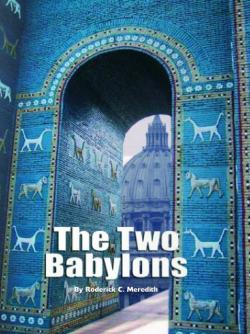Charismatic Renewal and the Gift of Tongues
"Speaking in tongues" is nowadays a much-misunderstood phenomenon. Some insist that "ecstatic speech" is evidence of the indwelling Holy Spirit. Others consider it optional or even dangerous. What is the truth of the matter? You need to know what God's Word says!
What is charismatic renewal? Does it involve "speaking in tongues"? What about the "speaking in tongues" practiced by the Church in the first century? Those who have espoused charismatic renewal in our modern day have claimed that they were simply seeking to restore "Apostolic Christianity." Does the modern "tongues" movement really represent the practices of the early Church?
Once a curiosity found mainly in widely ridiculed Pentecostal churches, speaking in tongues has now gone mainstream! Several years ago, even Newsweek magazine—normally noted for its hard-hitting coverage of secular news—published a major feature on "charismatic renewal." What was at one time a phenomenon confined to a narrow niche in the professing-Christian world is now spreading across the entire denominational spectrum. Charismatic renewal has become the world's fastest growing religious movement. It is no longer only "Pentecostals" who speak in tongues. Nowadays, Episcopalians, Methodists, Lutherans and even Catholics have all gotten into the act.
Many claim that charismatic renewal is the harbinger of a spiritual revival in America and much of the rest of the world. Is this truly what is on the horizon in the years immediately ahead? Our secular, materialistic society has certainly not been able to provide satisfying answers to life's really big questions, so many people are trying to fill the void in their lives—the spiritual "empty spot." Does the modern tongues movement hold the key to satisfying the spiritual hunger felt by so many?
Today we are certainly living in a wilderness of religious confusion. How can we know what is real and what is true? Does the charismatic renewal movement now sweeping America truly represent a latter-day outpouring of God's Spirit? Will it supply the answers people are seeking?
If not, then what exactly does it portend?
What Is Charismatic Renewal?
The English word "charismatic" is derived from the Greek word charisma, meaning "gift." Various forms of this word are used frequently in the Greek New Testament and, in addition to the word "gift," are often translated as "grace" or "favor." Most often the reference is to the freely bestowed gifts that God offers His people. Charismatic renewal is used to refer to a revival or renewal of spiritual gifts in the modern-day Christian Church. Many professing Christians regard manifestations such as speaking in tongues as part of a renewal of the biblical gifts mentioned in the New Testament.
To begin, we need to understand the origin of the modern-day tongues movement. What is now sweeping across denominational lines had its beginnings with the Pentecostal movement in the early part of the 20th century. On January 1, 1901, Agnes Ozman, a young woman attending Bethel Bible College in Topeka, Kansas, claimed to have received a special "baptism of the spirit" and to have been given the gift of tongues.
Shortly afterward, others at the college began to report similar experiences and, motivated by a newfound zeal, sought to evangelize, beginning in Missouri and Texas. "One of their converts was William J. Seymour.... In 1906 in the Apostolic Faith Gospel Mission on Azusa Street [in Los Angeles], Seymour was used to launch the real beginnings of modern Pentecostalism" (The Dictionary of Bible and Religion, p. 797). The 1906 Azusa Street Revival is reckoned as the origin of the modern Pentecostal movement. Groups such as the Assemblies of God, United Pentecostal Church, International Church of the Four-Square Gospel, and Church of God (Cleveland, Tennessee) all had their origins in this movement.
For much of the 20th century, outsiders derisively described people involved in the Pentecostal movement as "Holy Rollers." Pentecostal services were generally characterized by an emotionally charged atmosphere, generated by the styles of both the music and the preaching. Emotional "testimonies," along with "faith healing" and "speaking in tongues," all played an important part in the services. Because many Pentecostals lacked formal education, and often came from lower socioeconomic levels, members of other denominations typically looked down on them.
But through tent revivalists such as Aimee Semple McPherson, A. A. Allen and Oral Roberts, growing attention was given to the charismatic movement in the first 50 years of its existence. During the 1960s, the charismatic movement began a crossover from the various Pentecostal groups into mainline Protestantism. In the last 25 years or so, its popularity has skyrocketed.
Speaking in Tongues
The focal point of the Pentecostal movement (and now of the entire charismatic movement) is its emphasis on speaking in tongues, or "glossalalia"—a term derived from the Greek words for "tongue" and "speaking." But just what does the Bible mean when it mentions speaking in tongues? Is it identical to what happens in the modern charismatic movement?
The Greek word for tongue, glossa, is used primarily in three ways according to the Arndt-Gingrich Greek-English Lexicon. In one case it simply means the tongue, the organ of speech. In another it refers to a language. The third usage refers to a phenomenon found in pagan Hellenistic religion with the broken speech patterns of people in religious ecstasy (p. 161).
Speaking in tongues played a little-known role in ancient pagan religion. The concept of ecstatic speech, unintelligible to the hearers, was well known in ancient Greece. The shrine of Apollo at Delphi, a short distance from the city of Corinth, was the site of the most famous oracle of the ancient world. The priestess of Apollo would work herself into a religious frenzy and then fall down to the ground, often in a sort of convulsive fit, and come under the "possession of the god." While in this state she would babble unintelligible words (the language of the gods) that were written down and "interpreted" by the priests. Similar events happened at other oracles throughout the Mediterranean world.
Ecstatic speech in the ancient world, however, was not limited to priestesses at the oracles. When the Eastern mystery religions spread westward into the Hellenistic world, they also incorporated the phenomenon of ecstatic speech. It was deemed to be communion with the gods. Thus, the use of frenzied, unintelligible speech, called by the ancient Greeks "speaking in tongues," was well-known in the first century.
But is this at all akin to what the Bible describes? The most detailed account of speaking in tongues as a gift of God is given in Acts 2. There are several points that should be noted.
First, the phenomenon was manifested suddenly (v. 2). The words that began to pour from the mouths of the Apostles were not the result of an emotionally charged meeting. They were not working themselves up through frenzied music or the repetition of certain religious phrases. This was a miracle of God that came about instantly. Second, there is no mention of any of the Apostles falling to the floor "under the power," or of any of the other excesses that so often characterize modern Pentecostal meetings.
The emphasis given in Acts 2 is not one of putting on a show. Rather, it is one of delivering an important message. There were miraculous signs accompanying the message to authenticate it.
An important key that must be noted in Acts 2:4–12 is that the Apostles were not using so-called ecstatic speech. Instead, they were speaking in known languages that members of their audience clearly understood. This was the time of Pentecost, the second of the three annual pilgrim Festivals given by God to the ancient Israelites. There were Jews who had gathered in Jerusalem from all over the known world for this occasion—Jews who each spoke the language of his homeland.
It was not long before increasing numbers recognized their own native language (v. 8)—though initially some, who did not understand the particular language they were hearing, supposed the Apostles to be drunk (v. 13). Since this was a time before electronic amplification and public address systems, it is reasonable to suppose that the Apostles stood at some distance apart and faced in different directions, all preaching the same message but in different languages—languages known to the listeners, but unknown to the Apostles themselves! Those who understood a particular Apostle began to gather closer to him to hear what he had to say. Acts 2:14–42 emphasizes the content of Peter's speech. He was not repeating the same catch-phrases over and over. Rather, he was relaying a vitally important message.
Of course, the mechanics of this special Pentecost meeting may have happened a little differently than the description just given—the Bible does not give a precise account. But this much is indisputable—Peter and the other Apostles were speaking in foreign languages that were intelligible to their listeners. Thus, the gift of tongues was a tool of evangelism.
Clearly God's true gift of tongues differs vastly from what masquerades as that gift today. It is not uncommon for a hyper-excited, worked-up Pentecostal to sway, moan, "dance in the Spirit," laugh hysterically or shout out in unintelligible speech, or even meaningless guttural gibbering. How very different from the biblical example!
Baptism of the Spirit
Is being baptized with the Spirit something separate from initial conversion? Those in the charismatic movement would generally say that it is.
But what does the Bible really teach? In Acts 1:5, the Apostles were told that though they had earlier been baptized with water, they would shortly be baptized with the Holy Spirit. In verse 8, Christ equated this with receiving the Holy Spirit and being empowered to carry out the task of preaching the Gospel that He had set before them. They had not received the Spirit at the time they were baptized because the Holy Spirit was not available to them until after Christ returned to the Father (John 7:39; 16:7). In Acts 2:4, we read that on the Feast of Pentecost they were suddenly filled with the Holy Spirit.
Clearly, it is receiving the Holy Spirit that truly makes us converted Christians (Romans 8:9). How, then, do we receive the Holy Spirit? Peter explained in his sermon on Pentecost, "Repent, and let every one of you be baptized in the name of Jesus Christ for the remission of sins; and you shall receive the gift of the Holy Spirit" (Acts 2:38). In Acts 5:32, Peter emphasized that God gives His Spirit to only those who obey Him. And having the Holy Spirit within us is what makes us a true Christian—God's begotten child (Romans 8:16).
However, every spiritual manifestation is not necessarily from God. The Apostle John exhorted his readers, "Do not believe every spirit, but test the spirits, whether they are of God" (1 John 4:1). What, then, is the true evidence of the Holy Spirit? God's Spirit is only offered to those who believe the Gospel message that Jesus brought, and have truly repented as a result. They have unconditionally surrendered their lives to their Creator and have, therefore, begun to obey Him.
Next, there is fruit that the Holy Spirit bears in our lives. This fruit is described in Galatians 5:22–23 as love, joy, peace, longsuffering, kindness, goodness, faithfulness, gentleness and self-control. In other words, the Holy Spirit changes our lives and fills us with God's love, which enables us to obey His holy and righteous law—showing evidence of His very nature within us (Romans 5:5; 13:10).
The initial bestowal of the Holy Spirit on Pentecost was accompanied by miraculous signs. In addition, there are at least two other occasions recorded in the book of Acts where miraculous signs, including the gift of tongues or languages, were given.
Several years after that first New Testament Pentecost, we read of Peter going to the house of Cornelius, a Gentile soldier who had been seeking God. After preaching the Gospel to the members of his household, Peter and those with him were astonished to see the Holy Spirit come upon these Gentiles and grant them the miraculous gift of speaking in other languages (Acts 10:44–47). Peter and his companions understood that these Gentiles were magnifying God (v. 46). It took this miracle from God to convince Peter and the other Church leaders that God would accept physically uncircumcised Gentiles as well as Jews (11:17).
In Acts 19, we have an account of individuals who had years earlier been baptized by John the Baptist and who now considered themselves to be disciples of Christ. When the Apostle Paul talked with them, it became clear that they had not fully understood the Gospel and knew nothing about the Holy Spirit. Thus, they had never been truly converted.
So Paul baptized them again—this time in the name of Jesus Christ—and then laid hands on them so that they would receive God's Spirit (v. 5). In this instance also, the Spirit came with miraculous manifestations, clearly showing the distinction between the baptism that John offered and that offered by Christ.
There is no statement in the Bible that receiving God's Spirit is commonly accompanied by some miraculous display. In fact, God's Word says that, in general, "tongues are for a sign, not to those who believe but to unbelievers" (1 Corinthians 14:22). So we should not normally expect to see such a manifestation among believers. However, in the specific instances just mentioned, and most likely at the time of the initial conversion of some in Samaria as well (Acts 8:14–18), there was miraculous evidence of God's Spirit. All these events were definite "firsts"—and God acted in a special way in order to make clear His involvement and blessing with these never-before-seen phenomena.
Spiritual Gifts
This is not to say that miracles were limited to the first century. Just as the Spirit of God is the Spirit of love and of a sound mind, it is also the Spirit of power (2 Timothy 1:7). The Greek word translated as "power" is dunamis, a term generally meaning miracle-working power. God offers us His Spirit to transform our nature and to fill us with His love. His Spirit also imparts a soundness and balance of judgment in applying the principles of His Word to everyday life. But in addition to all of this, God's Spirit is the power or agency through which He works in miraculous ways. It is the means by which the Almighty imparts gifts to His people. Spiritual gifts are good. Paul discussed the wide variety of such gifts available (Romans 12:6–8; 1 Corinthians 12:6–11) and taught that we should desire them (14:1).
But he also made it plain that the Corinthians had greatly misunderstood spiritual gifts, especially the gift of tongues, just like many today. This was because of their pagan background (12:1–2). Having grown up only a few miles from the Delphic Oracle, many Corinthians confused the miraculous gift of languages given by God on Pentecost and other occasions with the sort of "speaking in tongues" they had heard about all their lives. So, also, do many today.
Paul emphasized in 1 Corinthians 14 that the gifts God gives are for edifying or strengthening the Church. He encouraged his readers to seek God's gifts for the purpose of serving others—not for self-aggrandizement. As for tongues or languages, Paul explained that it was better to speak just a few words that were understandable and helpful, rather than ten thousand words in a language no one could understand (v. 19). For unless the content is helpful and instructive, words in and of themselves lack benefit to the hearers (v. 6, 9).
A prophecy in Joel 2:28–32 foretells an end-time outpouring of God's Spirit in a miraculous way. Peter quoted this scripture and applied it to the miracle that occurred on the first Pentecost after Christ's resurrection from the dead. It is apparent upon close scrutiny, however, that a much greater fulfillment of this prophecy is for the time just prior to the Day of the Lord (v. 31). Thus, many of the miraculous outpourings of God's Spirit that happened in the first century will undoubtedly occur again in the end time.
However, from what we have seen, it should be clear that the "speaking in tongues" commonly practiced today in the charismatic movement—with its incoherent babbling often accompanied by uncontrollable shrieks and spasms—is most certainly not from God. "For," as Paul says in his discussion on tongues, "God is not the author of confusion" (1 Corinthians 14:33). Indeed, we may rightly discern that most of the "speaking in tongues" that goes on today has a different author—either demonic spirits or simply human imagination. For just as demons were involved in the pagan Greek religion of long ago with its babbling oracles (cf. 1 Corinthians 10:20), so also are they involved in false religion today (for a more detailed exposition of this subject, please write for our free booklet, What Is a True Christian?). If the author of individuals' ecstatic speech is the human mind, it is either an outright fraudulent act, some form of mental illness or simply a frenzy of human emotion.
True miracles, however, are not brought about by human emotion. They are, rather, the result of God supernaturally working through His true servants—those who genuinely obey Him and are yielded to His will. As mentioned at the outset, in the spiritual confusion of modern religion, many today recognize a great void in their lives. Without real understanding of God's ultimate purpose and plan, they are accepting a counterfeit of true spirituality. They are pursuing a feeling—and are therefore setting themselves up to be deceived by the end-time false miracles of which Christ warned (Matthew 24:24). We should seek God and His ways—not feelings.
If we do so with all our heart and continue to genuinely walk with Him, the true miracles will certainly follow in God's own time.






